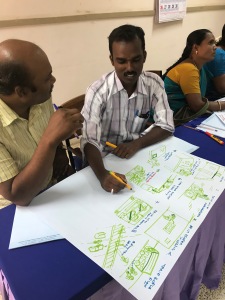
” I learned in this training to identify in my personal daily life where and how I can avoid risks to protect myself and my family,” tells me one of the self help group members of a suburb close to Coimbatore, South India. “I will share this with my friends and neighbors. This is something we can fix without money, something that helps immediately to be integrated into our life.”
Health programs often focus on specific diseases and disease prevention, but there are only a few programs run by e.g. companies and NGOs which take into account daily health issues and are based on what the people in villages and self help groups in poor rural and urban surrounding are asking for on a more basic and holistic level.
Just imagine the impact of such trainings!
Before we started our two years program based on 12 different health topic modules we went into the villages in Tribal India and poor suburb communities and asked what the people, living in disadvantaged surroundings and organized In self help groups (often close to the poverty line) would like to learn about health. Based on what they told us we shaped our MMH health awareness program. The training on how to avoid risks in the daily life was one of the answers we got.
There was a very clear outcome of the answers we got: we want to learn about…
- Animal health (“because animals are our income source”) ,
- mental health (“because we need to become more self-confident and be able to understand symptoms for dementia and how to run elderly care)
- Addiction issues (because we need to learn on how to act when we have alcohol issues in the villages”)
- How to reduce accidents in the own surrounding (electric issues, safe water practices…)
 “I was not aware that accidents mainly happen when we don’t think about it. I thought climbing in the hills and difficult pathways would cause more accidents. But I learned that obvious dangerous situations make us pay attention and we focus our senses to avoid risks. We concentrate On how to handle it and this leads to a lower rate of accidents. But when things seem to be less dangerous, we often underestimate potential risks. Accidents mostly happen when we think we have everything under control and we have done it a thousand times “, a participant summarizes after the one day training. “We do not even see the risk anymore…and think it happens to others only. But the others that’s us. ”
“I was not aware that accidents mainly happen when we don’t think about it. I thought climbing in the hills and difficult pathways would cause more accidents. But I learned that obvious dangerous situations make us pay attention and we focus our senses to avoid risks. We concentrate On how to handle it and this leads to a lower rate of accidents. But when things seem to be less dangerous, we often underestimate potential risks. Accidents mostly happen when we think we have everything under control and we have done it a thousand times “, a participant summarizes after the one day training. “We do not even see the risk anymore…and think it happens to others only. But the others that’s us. ”
“I learned a lot when I understood how long are the decay times for cigarettes and plastics. I will not ask for plastic bags any more and why do they package then all the modern food in so much plastics? “asks me a woman. Good question!
This safety and environmental training was a real eye-opener – not just for the participants, but also for our team and company to think differently on how we have to make more health happen:
My conclusion
- Focus much more on the customers need even in CSR health programs and start from where the people see the needs
- Don’t sell your own ideas about health issues, but focus on the people’s health demands first.
- Make it simple and start from where the people are and from what they can handle give them the chance to apply at a large scale what they learn in the villages and groups. In this way they can see also easily results of their own engagement.
- Keep it easy and be more pragmatic than strategic.
- Even it might not sound that high level as running specific NCD (non communicable disease) programs – don’t get me wrong this is needed, too)- and even it will not sell that well from business perspective in terms of reputation – we should definitely not forget to inform people of the base of pyramid on how to conduct their daily life in a health way!
A great Learning with surprising accidence risks in daily life of Indian People. This Program should definately bei continued!
LikeLike